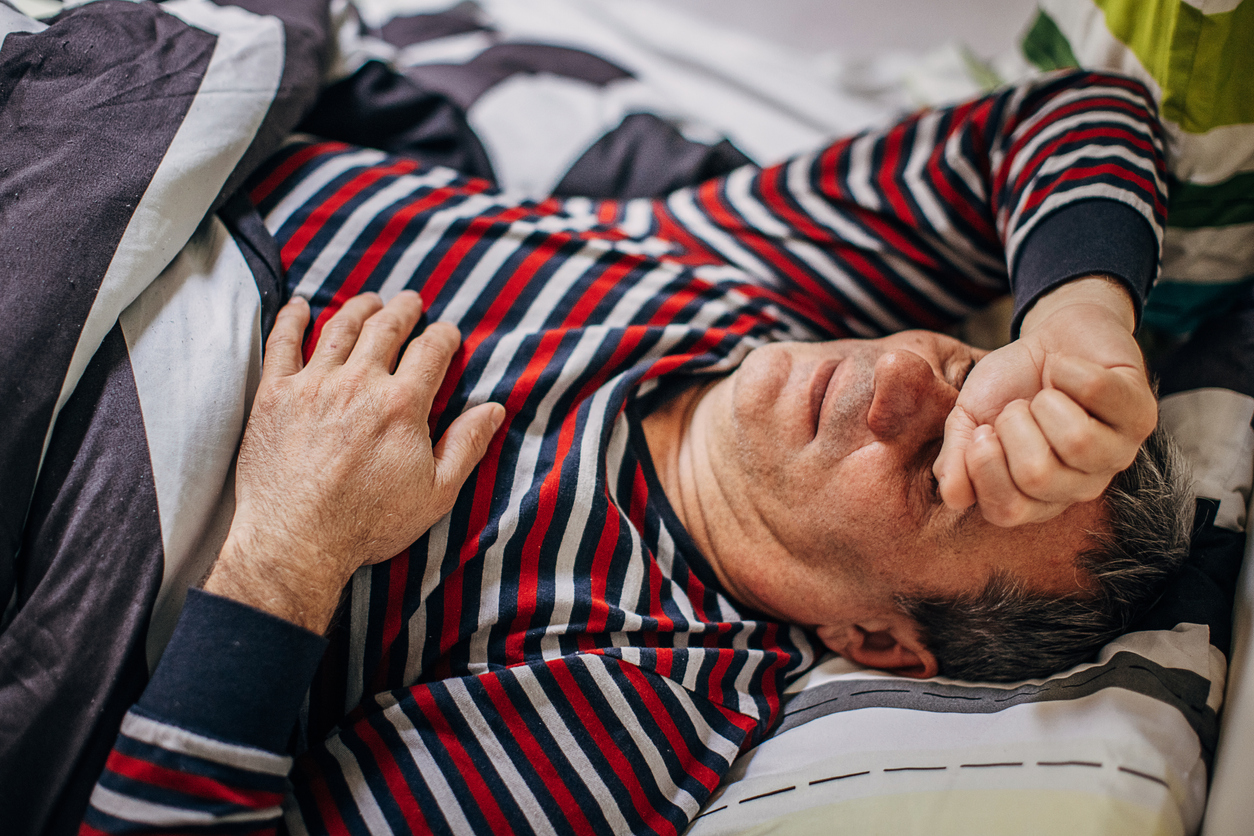The public’s awareness of Lewy body dementia (LBD) may have increased since the tragic 2014 suicide of Robin Williams, who suffered from the disease, but LBD is actually the most common type of dementia after Alzheimer’s disease (AD), according to Medline Plus, with approximately 1.4 million people in the United States affected by the condition.
AD and LBD are both forms of dementia, and while they are similar in some aspects, there are also important differences. “As the name suggests, Lewy body dementia is believed to be caused by the buildup of Lewy body proteins in the brain,” reports Verywell Health. “Alzheimer’s is characterized by amyloid plaques and neurofibrillary tangles in the brain.” The symptoms differ as well—and one specific nighttime issue is associated with the onset of LBD. Read on to find out what it is.
READ THIS NEXT: If You Do This During the Day, It May Be an Early Sign of Dementia.
The buildup of Lewy body proteins affect chemicals in the brain, says Kashmira Govind, a pharmacist with the Farr Institute. She explains that these chemical changes may impair thinking, movement, behavior, and mood.
This can lead to myriad symptoms, as the disease manifests in many different ways. “Hallucinations; seeing, hearing or smelling things that are not there; issues with understanding, thinking, memory, and judgment,” are all potential warning signs, says Govind. “The most common symptoms include changes in cognition, movement, sleep, and behavior,” she says—but the signs don’t stop there and are extremely varied. Govind warns they also can include changes in body temperature, dizziness, frequent falls, and sexual disfunction, among other symptoms.

The symptoms of LBD can manifest in both the body and the brain. “Lewy body dementia causes a progressive decline in mental abilities,” explains the Mayo Clinic. “People with Lewy body dementia might have visual hallucinations and changes in alertness and attention.” Other symptoms can be similar to Parkinson’s disease, such as “rigid muscles, slow movement, walking difficulty, and tremors.”
These similarities can often lead to a misdiagnosis (Robin Williams was mistakenly diagnosed with Parkinson’s before his death in 2014; only afterwards would an autopsy reveal that he’d been afflicted with LBD). The major difference between the two diseases is the order in which the symptoms occur, according to the Davis Phinney Foundation for Parkinson’s. (In dementia with Lewy bodies, dementia symptoms will appear first, before the motor skills are affected.)
For more health news sent directly to your inbox, sign up for our daily newsletter.

In addition to the neurological and physiological symptoms of Lewy body dementia, a very specific behavior may be the first sign of the disease.
“Rapid eye movement (REM) sleep behavior disorder is a sleep disorder in which you physically act out vivid, often unpleasant dreams with vocal sounds and sudden, often violent arm and leg movements during REM sleep—sometimes called dream-enacting behavior,” reports the Mayo Clinic. This condition can manifest years before other symptoms of LBD occur.
“We can diagnose the sleep disorder with a sleep study,” neurologist James Leverenz, MD, tells the Cleveland Clinic. “And there’s a high chance that a person with this disorder will develop LBD or Parkinson’s disease.” Leverenz notes that this behavior is often first noticed by the patient’s bed partner. “Often when someone comes in for an evaluation, and we ask about sleep disturbances, the bed partner says, ‘Oh, they’ve been doing that for years,'” he notes.

There is currently no cure for Lewy body dementia or other forms of cognitive decline like Alzheimer’s disease. However, the National Institute on Aging (NIH) explains that some symptoms can be effectively treated for a while. “An LBD treatment plan may involve medications, physical and other types of therapy, and counseling,” the NIH says. “A plan to make any home safety updates and identify any equipment can make everyday tasks easier.” Knowing the symptoms of dementia is crucial, as an early diagnosis can mean access to treatment and management options.
Govind also recommends making healthy lifestyle choices which may possibly decrease the risk of dementia. Physical exercise, eating a healthy diet, limiting your alcohol intake, and not smoking are all ways you can slash your risk of LBD, Alzheimer’s, and other forms of this debilitating disease.